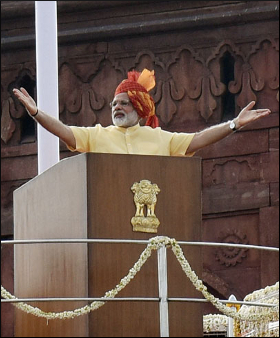|

|
Is doing business in India really easier now?
|
|

|
|
| Top Stories |
 |
|
|
|
Amit Kapoor | 14 Nov, 2017
Prime Minister Narendra Modi's efforts in building India's global appeal
for investors seems to have finally yielded returns in terms of the
country's performance in the World Bank Doing Business rankings. India
witnessed its highest-ever jump of 30 places in the rankings, reaching
the 100th place among 190 countries. Subsequently, it also joined the
list of top 10 improvers for the first time and became the first South
Asian country to achieve the feat.
The World Bank measures this
in terms of a Distance to Frontier (DTF) metric, which shows the
distance of the economy from the best performer in each category on a
scale of 0 to 100, with the latter representing the frontier. India has
shown a drastic improvement of 4.71 points over the last year from 56.05
to 60.76. To put things in perspective, China has witnessed an increase
of 0.40 points.
India's performance has been impressive by any
standard. It has moved closer to the global standards in nine of the ten
parameters on which the Doing Business rankings are based and has
enforced reforms in eight of these categories over the last year. The
three key reforms among these were resolving insolvency, ease of paying
taxes online and protection of minority investors. Despite these
improvements, the general sentiment has been to dismiss the rankings
mainly for the flaws in its methodology.
First, the rankings are
based on perception surveys of few entrepreneurs or professionals based
on questions that are mostly subjective in nature. Second, they are not
even based on the economic conditions of the entire economy but on one
or two cities within a nation. For India, it is based on Delhi and
Mumbai alone. However, the critics miss the point.
If India
performs poorly even on such a limited study that chooses the best
cities in the country, it speaks volumes of the business conditions
across the country and is indicative of the scope of improvement that
remains. Moreover, rankings are relative by definition and since the
World Bank chooses a maximum of two cities for other countries as well,
it should depict a near accurate performance of any country on a
relative scale. Therefore, any improvement up the ladder cannot be
summarily dismissed.
Further, reforms considered by the World
Bank include a mix of central and state initiatives. Passing of central
legislation like the Insolvency and Bankruptcy Code, 2016, that helped
India jump from 136 to 103 in the "resolving insolvency" parameter have
pan-India benefits and are not just limited to Delhi and Mumbai.
Therefore, it would be incorrect to presume that merely focusing on a
few cities is disassociated from reality even though the actions of
state governments are not reflected.
Incidentally, India performs
poorly in parameters where state government interference is maximum:
Getting an electricity connection, starting a business and registering a
property. This underlines the importance of policy coordination between
the states and the Centre. Nevertheless, credit needs to be given where
it is due for an improvement in rankings majorly driven by reforms
undertaken by the central government over the last few years. It must be
noted that the rankings have not taken into account the implementation
of the Goods and Services Tax (GST). Therefore, considerable potential
remains for further improvement.
But it should also be kept in
mind that these rankings are not an end in themselves and are far from
perfect. A lot of it is based on policies which are on the books and do
not necessarily capture the real experiences on the ground. After
reforms are initiated to ease the business environment, the main task of
implementation begins where the real problems emerge. For instance, the
World Bank applauded India's efforts at increasing access to credit
with the adoption of a new insolvency and bankruptcy code. However, the
parameters fail to recognise the problem that India is going through one
of its slowest phases of credit growth and that banks are wary of
lending so easily.
Moreover, a lot more parameters, apart from
the ones considered in the Doing Business rankings, need to be
considered to understand the business environment in India. The
country's dismal performance in the Heritage Foundation's Index of
Economic Freedom (in which it is ranked 143, below most of its South
Asian neighbours) and Transparency International's Corruption Perception
Index (ranked 79th), reflect the areas that the country still needs to
improve upon to better the business environment.
Therefore, the
chest-thumping around the Doing Business ranking improvements needs to
be seen in conjunction with these factors and worked upon to ease the
problems faced by common businessmen. A premature celebration can be
counter-productive.
(Amit Kapoor is chair, Institute for
Competitiveness, India. The views expressed are personal. He can be
contacted at amit.kapoor@competitiveness.in and tweets@kautiliya. Chirag
Yadav, senior researcher, Institute for Competitiveness, India has
contributed to the article)
|
|
|
| |
|
|
|
|
|
|
|
|
|
|
|
|
|
|
| |
| Customs Exchange Rates |
| Currency |
Import |
Export |
US Dollar
|
84.35
|
82.60 |
UK Pound
|
106.35
|
102.90 |
Euro
|
92.50
|
89.35 |
| Japanese
Yen |
55.05 |
53.40 |
| As on 12 Oct, 2024 |
|
|
| Daily Poll |
 |
 |
| Do you think Indian businesses will be negatively affected by Trump's America First Policy? |
|
|
|
|
|
| Commented Stories |
 |
|
|
|
|
|
| |
|